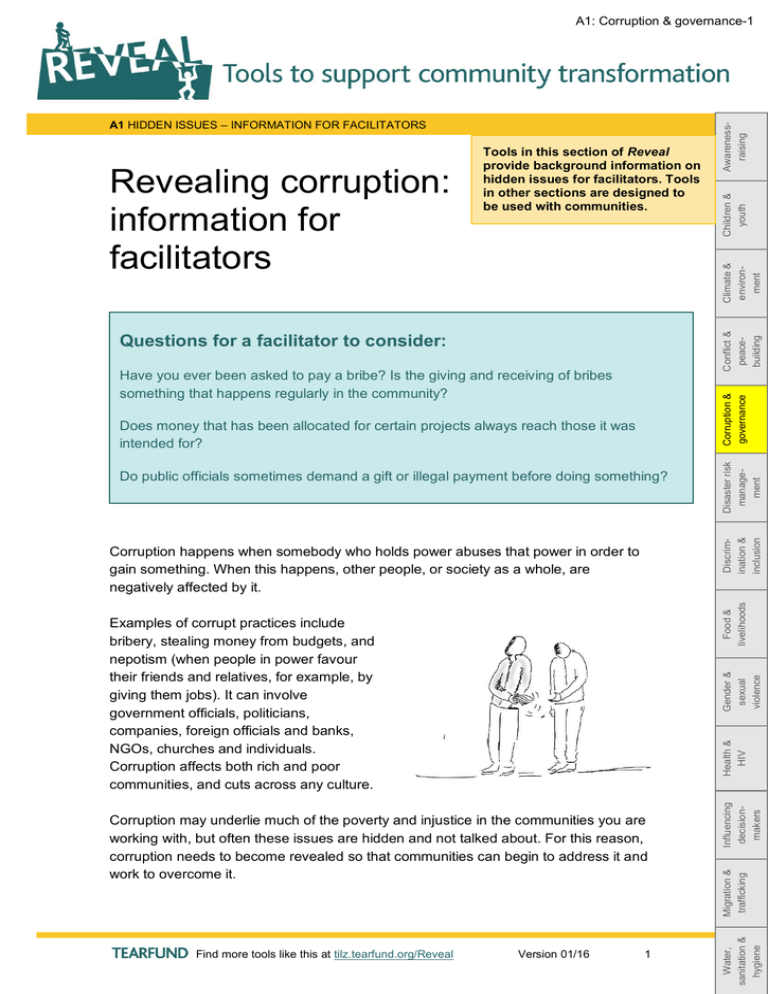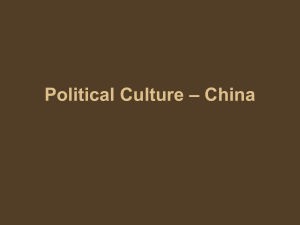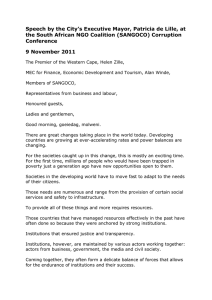Document 10781411
advertisement

Climate & environment Conflict & peacebuilding Questions for a facilitator to consider: Does money that has been allocated for certain projects always reach those it was intended for? Discrimination & inclusion Do public officials sometimes demand a gift or illegal payment before doing something? Food & livelihoods Corruption happens when somebody who holds power abuses that power in order to gain something. When this happens, other people, or society as a whole, are negatively affected by it. Version 01/16 1 Migration & trafficking Corruption may underlie much of the poverty and injustice in the communities you are working with, but often these issues are hidden and not talked about. For this reason, corruption needs to become revealed so that communities can begin to address it and work to overcome it. Influencing decisionmakers Health & HIV Gender & sexual violence Examples of corrupt practices include bribery, stealing money from budgets, and nepotism (when people in power favour their friends and relatives, for example, by giving them jobs). It can involve government officials, politicians, companies, foreign officials and banks, NGOs, churches and individuals. Corruption affects both rich and poor communities, and cuts across any culture. Find more tools like this at tilz.tearfund.org/Reveal Disaster risk management Corruption & governance Have you ever been asked to pay a bribe? Is the giving and receiving of bribes something that happens regularly in the community? Water, sanitation & hygiene Revealing corruption: information for facilitators Tools in this section of Reveal provide background information on hidden issues for facilitators. Tools in other sections are designed to be used with communities. Children & youth A1 HIDDEN ISSUES – INFORMATION FOR FACILITATORS Awarenessraising A1: Corruption & governance-1 A1: Corruption & governance-1 A1 HIDDEN ISSUES – REVEALING CORRUPTION Awarenessraising What does the Bible say? The Bible is clear that God loves justice and hates corrupt practices. Isaiah 61:8 says ‘For I, the Lord, love justice; I hate robbery and wrongdoing’. In Amos we hear ‘Let justice roll on like a river, righteousness like a never-failing stream’ (Amos 5:24). Children & youth God has always called his people to side with the most vulnerable people in society and to seek justice (Isaiah 1:17). His love of justice means that he ‘detests dishonest scales’ (Proverbs 11:1). Climate & environment Conflict & peacebuilding God desires truth in all our relationships. The Psalms speak of desiring ‘truth in the inmost being’ (Psalm 51:6), and the prophets condemn societies where ‘truth is nowhere to be found’ (Isaiah 59:15). The prophet Micah condemns abuse of the courts to defraud people of their livelihoods (Micah 2:2), the abuse of public office through bribery (3:11), wealth acquired through dishonest business practices (6:10-11) and conspiracy by those in power for their own benefit (7:3). Corruption & governance As God’s people, we are called to be salt and light (Matthew 5:13-16), which means both modelling a society based on God’s kingdom values and calling prophetically for change. Disaster risk management For Bible studies on this issue, please see Section B of Reveal. Understanding corruption Discrimination & inclusion Corruption can be understood as operating on different levels. Food & livelihoods Grand corruption takes place at the highest level of political authority. It is often driven by a desire for certain groups to maintain power. It may involve the stealing of public funds, obstructing criminal investigations or writing laws or policies to favour specific interest groups, such as favourable tax systems for companies in return for payment or the promise of political support. Gender & sexual violence Health & HIV Bureaucratic (or petty) corruption takes place at a more local level. This often involves public servants demanding illegal payments, for example to issue licences or permits, enrol children in schools, gain access to medical treatment or avoid being fined by traffic police. Influencing decisionmakers Migration & trafficking Quiet corruption is when public servants fail to deliver services due to absenteeism, poor performance, or simply not fulfilling their role, for example not enforcing environmental standards to prevent pollution by factories. Water, sanitation & hygiene Find more tools like this at tilz.tearfund.org/Reveal 2 A1: Corruption & governance-1 A1 HIDDEN ISSUES – REVEALING CORRUPTION Corruption affects all people, but poor people suffer the most. Corruption affects how wealth and resources are distributed in countries and communities, and makes the gap between rich and poor bigger. Conflict & peacebuilding Health & HIV Gender & sexual violence Food & livelihoods Public officials at a more local level may also sometimes become involved in corrupt practices, demanding payments or gifts from people. For example, patients may have to pay health clinic staff to get rapid attention, delaying the treatment of those who arrived first. Discrimination & inclusion Disaster risk management Corruption & governance Another example of corruption is when government funds intended for health, education and WASH (water, sanitation and hygiene) services are diverted or stolen by officials. This means that poor people’s access to, and the quality of, these services is affected. Clinics don’t get built, or there is less money to stock medicines or pay staff; schools lack resources such as desks and books; and wells stay broken as there is no money to repair them. Climate & environment Children & youth Sometimes corruption leads to people being unable to participate in political processes. And unfair and corrupt practices during elections affect which people get positions of political power. In some countries the justice system is badly affected by corruption meaning that guilty people are able to unfairly avoid punishment through paying bribes. Awarenessraising How does corruption affect people? Influencing decisionmakers A parent may have to pay to enrol their children in school. Or a policeman may seek payment to release a vehicle that is wrongly seized. 3 Water, sanitation & hygiene Find more tools like this at tilz.tearfund.org/Reveal Migration & trafficking All forms of corruption are wrong. There is often a belief that nothing can be done to challenge corruption, that the problem is too big and those involved in corruption are simply too powerful. However, while huge challenges exist, the church, ordinary citizens and civil society organisations can make a difference! A1: Corruption & governance-1 A1 HIDDEN ISSUES – REVEALING CORRUPTION Fears and challenges Awarenessraising Sometimes people feel they can’t avoid engaging in corruption (for example, accepting a bribe) or feel they cannot work to tackle corruption, because they are afraid for their own, or their family’s, safety. However, it is crucial that people stand up to corruption. The fears and risks people face will depend on the context. It is important to be aware of any risks involved in confronting corruption and to try to lessen these risks. Here are some steps to help overcome challenges and fears: Be aware of your rights and who to contact if you face any harassment. Try to focus on things that are wrong with a system or process, rather than who in particular is to blame. As much as possible, focus on what needs to be done, giving examples of good practice. Respect those in power and give them clear explanations about what is being done. As much as possible, build networks and links with other local groups and organisations such as CBOs and NGOs. Try to build good relationships with the local authority and/or police. Work with the media. This will make your work to confront corruption more visible and enable the media to work with you and to play their role in tackling corruption (see Tool C1: Working with the media). Children & youth Climate & environment Conflict & peacebuilding Corruption & governance Disaster risk management Using Reveal Reveal includes tools to help you raise the issue of corruption with communities. You can find these in Section A2.You can find Bible studies to explore this issue in Section B. And there are also tools to help communities tackle corruption in Section C2. Discrimination & inclusion Finding out more Tearfund (2008) Footsteps 76 - Accountability http://tilz.tearfund.org/en/resources/publications/footsteps/footsteps_71-80/footsteps_76/ Food & livelihoods Notes Gender & sexual violence Much of the content in this tool is adapted from Tearfund (2012) Why advocate on governance and corruption? http://tilz.tearfund.org/~/media/Files/TILZ/Topics/Why%20advocate%20on%20governance%20and%20corruption. pdf Health & HIV Influencing decisionmakers Migration & trafficking Related tools: B – Advocacy work (Bible study) [B: Influencing decision-makers-1] B – Being an advocate (Bible study) [B: Influencing decision-makers-2] B – Fighting injustice (Bible study) [B: Influencing decision-makers-3] B – The role of the church in advocacy (Bible study) B: [Influencing decision-makers-4] C1 – Advocacy – communicating with people in power [C1: Influencing decision-makers-1] C1 – Mobilising people [C1: Influencing decision-makers-2] C1 – Making the most of meetings with decision-makers [C1: Influencing decision-makers-4] C2 – Monitoring government spending [C2: Corruption & governance-1] C2 – Tackling bribery [C2: Corruption & governance-2] Water, sanitation & hygiene Find more tools like this at tilz.tearfund.org/Reveal 4





